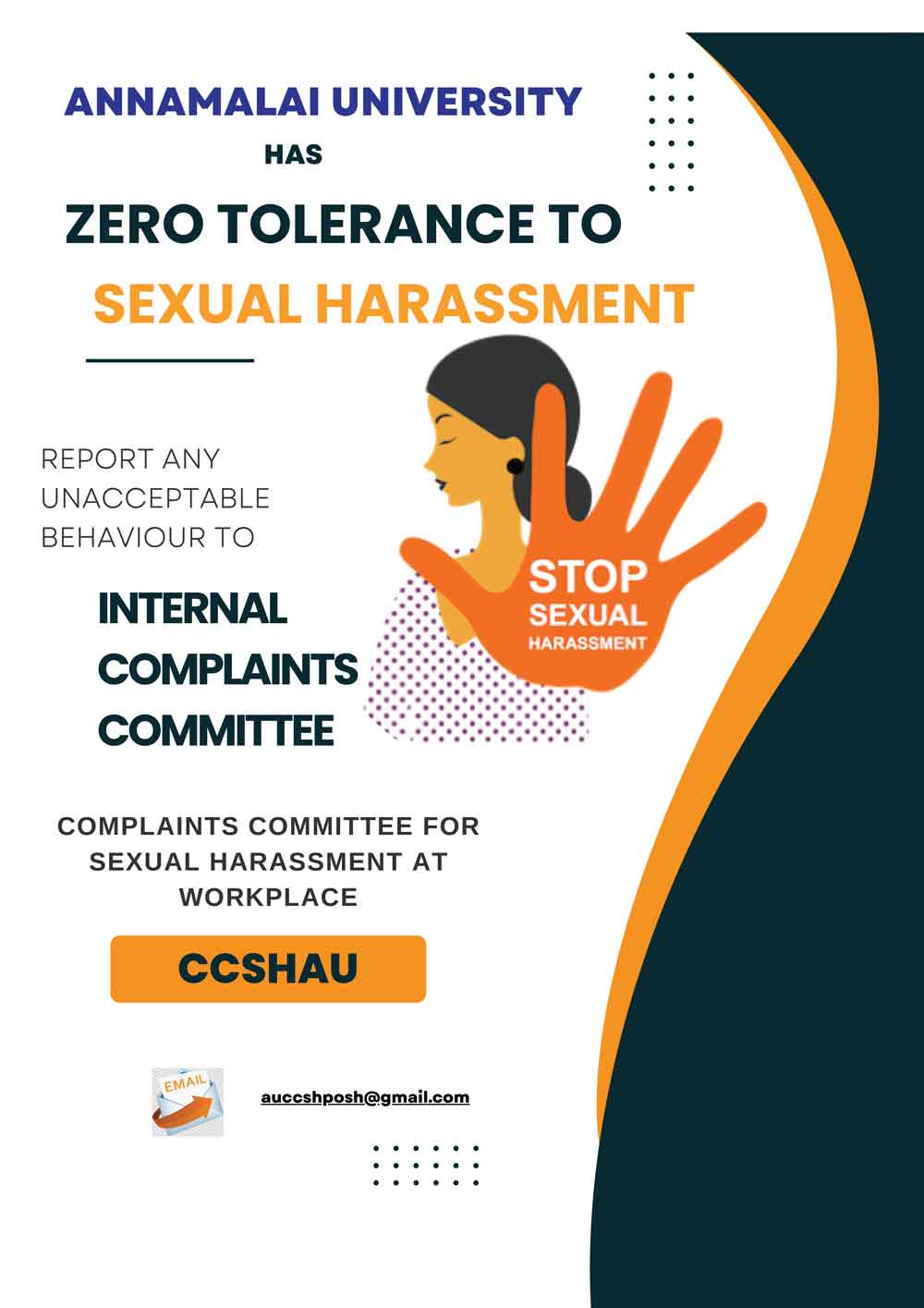Home > Student Support > Internal Complain Committee


Prevention, Prohibition and Redressal Act 2013
The sexual harassment of women at workplace (Prevention, Prohibition and Redressal) Act 2013 was enacted to provide protection against sexual harassment of women at workplace and for the prevention and redressal of complaints of sexual harassment and for matters connected therewith or incidental thereto. The act uses a definition of sexual harassment which was laid down by the Supreme Court of India in Vishaka v. State of Rajasthan (1997). Article 19 (1) g of the Indian Constitution affirms the right of all citizens to be employed in any profession of their choosing or to practice their own trade or business. Vishaka v. the State of Rajasthan established that actions resulting in a violation of one’s rights to ‘Gender Equality’ and ‘Life and Liberty’ are in fact a violation of the victim’s fundamental right under Article 19 (1) g. The case ruling establishes that sexual harassment violates a woman's rights in the workplace and is thus not just a matter of personal injury.
The Bill was first introduced by Women and Child Development Ministry in 2007 and approved by the Union Cabinet in January 2010. It was tabled in the Lok Sabha in December 2010 and referred to the Parliamentary Standing Committee on Human Resources Development. The committee's report was published on 30 November 2011. In May 2012, the Union Cabinet approved an amendment to include domestic workers. The amended Bill was finally passed by the Lok Sabha on 3 September 2012. The Bill was passed by the Rajya Sabha (the upper house of the Indian Parliament) on 26 February 2013. It has come into force and has been published in the Gazette of India, Extraordinary, Part-II, Section-1, dated the 23rd April 2013 as Act No. 14 of 2013.
Sexual harassment results in violation of the fundamental rights of a woman to equality under Articles 14 and 15 of the Constitution of India and her right to life and to live with dignity under Article 21 of the Constitution and right to practice any profession or to carry on any occupation, trade or business which includes a right to a safe environment free from sexual harassment.
The protection against sexual harassment and the right to work with dignity are universally recognized human rights by international conventions and instruments such as Convention on the Elimination of all Forms of Discrimination against Women, which has been ratified on the 25th June, 1993 by the Government of India. It is expedient to make provisions for giving effect to the said Convention for protection of women against sexual harassment at workplace.
This Act also covers students in schools and colleges as well as patients in hospitals. Employers and local authorities will have to set up grievance committees to investigate all complaints.
SEXUAL HARASSMENT : “Sexual Harassment” includes any one or more of the following unwelcome acts or behaviour (whether directly or by implication) namely:—
The sexual harassment of women at workplace (Prevention, Prohibition and Redressal) Act 2013 was enacted to provide protection against sexual harassment of women at workplace and for the prevention and redressal of complaints of sexual harassment and for matters connected therewith or incidental thereto. The act uses a definition of sexual harassment which was laid down by the Supreme Court of India in Vishaka v. State of Rajasthan (1997). Article 19 (1) g of the Indian Constitution affirms the right of all citizens to be employed in any profession of their choosing or to practice their own trade or business. Vishaka v. the State of Rajasthan established that actions resulting in a violation of one’s rights to ‘Gender Equality’ and ‘Life and Liberty’ are in fact a violation of the victim’s fundamental right under Article 19 (1) g. The case ruling establishes that sexual harassment violates a woman's rights in the workplace and is thus not just a matter of personal injury.
The Bill was first introduced by Women and Child Development Ministry in 2007 and approved by the Union Cabinet in January 2010. It was tabled in the Lok Sabha in December 2010 and referred to the Parliamentary Standing Committee on Human Resources Development. The committee's report was published on 30 November 2011. In May 2012, the Union Cabinet approved an amendment to include domestic workers. The amended Bill was finally passed by the Lok Sabha on 3 September 2012. The Bill was passed by the Rajya Sabha (the upper house of the Indian Parliament) on 26 February 2013. It has come into force and has been published in the Gazette of India, Extraordinary, Part-II, Section-1, dated the 23rd April 2013 as Act No. 14 of 2013.
Sexual harassment results in violation of the fundamental rights of a woman to equality under Articles 14 and 15 of the Constitution of India and her right to life and to live with dignity under Article 21 of the Constitution and right to practice any profession or to carry on any occupation, trade or business which includes a right to a safe environment free from sexual harassment.
The protection against sexual harassment and the right to work with dignity are universally recognized human rights by international conventions and instruments such as Convention on the Elimination of all Forms of Discrimination against Women, which has been ratified on the 25th June, 1993 by the Government of India. It is expedient to make provisions for giving effect to the said Convention for protection of women against sexual harassment at workplace.
This Act also covers students in schools and colleges as well as patients in hospitals. Employers and local authorities will have to set up grievance committees to investigate all complaints.
PROVISIONS
The Act will ensure that women are protected against sexual harassment at all the work places, be it in public or private. This will contribute to realisation of their right to gender equality, life and liberty and equality in working conditions everywhere. The sense of security at the workplace will improve women's participation in work, resulting in their economic empowerment and inclusive growth.
The Act defines sexual harassment at the work place and creates a mechanism for redressal of complaints. It also provides safeguards against false or malicious charges.
- Physical contact and advances; or
- A demand or request for sexual favours; or
- Making sexually coloured remarks; or
- Showing pornography; or
- Any other unwelcome physical, verbal or non-verbal conduct of sexual nature
- The following circumstances, among other circumstances, if it occurs or is present in relation to or connected with any act or behaviour of sexual harassment may amount to sexual harassment:
- Implied or explicit promise of preferential treatment in employment / teaching / evaluating / guidance; or
- Implied or explicit threat of detrimental treatment in employment / teaching / evaluating / guidance; or
- Implied or explicit threat about her present or future employment status / evaluation; or
- Interferes with her work or creating an intimidating or offensive or hostile work / learning / training environment for her; or
- Humiliating treatment likely to affect her health or safety.
